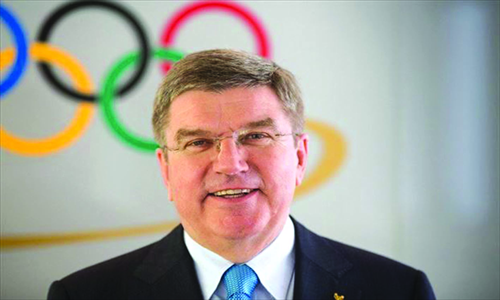Youth Games faces changes in future
Editor's Note:
As the newly elected president of the International Olympic Committee (IOC), Thomas Bach (Bach) visited Nanjing recently to inspect the progress of the upcoming Youth Olympic Games. At the press conference, President Bach answered questions about his expectations for the upcoming Olympic Games and the challenges he believes the IOC should deal with.

Thomas Bach
Q: Nanjing will be the first Chinese city to host the Youth Olympic Games. What do you think of the current preparations for the event?
Bach: The news I have received about the Nanjing event has been very positive. So far the preparations are running very smoothly. We are confident that we will have a great Olympic Youth Games here. The Nanjing public will enjoy the presence of youth from around the world.
Q: As the brainchild of your predecessor Jacques Rogge, the survival of the Youth Olympic Games is in doubt given the fact that it is far less popular than the summer and winter Olympics. What are your thoughts on the future of the Youth Olympic Games?
Bach: Actually we have seen two great successes so far, in Singapore and Innsbruck, and we are sure Nanjing will be another great success. That is why we have confidence.
On the other hand, after Nanjing, we will have to assess one way or another how the Youth Olympic Games should be adapted in the future. Maybe it should be more open to different sports and physical activities.
We will discuss the future organization of the Youth Olympic Games next year. One of the options is to have modern youth sports involved in the Youth Olympic Games and to open it up even more to the population to get the youth in the host city and the host country to practice sports with the young athletes being present, a program which has been initiated by the Nanjing organizers.
Q: Beijing and Zhangjiakou have launched a joint bid for the 2022 Winter Olympic Games. But since Pyeongchang of South Korea will host the 2018 Winter Olympic Games, and Tokyo will host the 2020 Summer Olympic Games, will Beijing and Zhangjiakou be in a disadvantaged position when competing with candidates outside Asia?
Bach: We are very pleased to receive the bid launched by Beijing and Zhangjiakou, because it offers a new approach to the Winter Olympic Games - offering winter sports to a capital like Beijing and to the people all over China. It is a very interesting approach. We are happy to have six candidates, which is double the number of the 2018 race.
I think the IOC members look at each bid individually. Of course overall, we want to have a universal movement, and address different continents. But this has nothing to do with individual decisions.
Q: You said the World Anti-Doping Agency (WADA) code is clear, and countries which are not compliant can be excluded from events including the Olympic Games. Might the rules be too harsh, because they would prevent many innocent, talented athletes from these events?
Bach: Actually, one has nothing to do with the other. First of all, that is an issue for the WADA. According to the WADA code, it is up to the WADA to decide whether any national Olympic committees or international federations are compliant with the code or not.
And then we can draw our conclusions from there. This has nothing to do with individual athletes. It is only about having a reliable anti-doping system and implementing the WADA code.
Q: The 2014 Sochi Winter Olympics in Russia will be the first event since you took office. What expectations do you have for it, and what challenges do you think it might face?
Bach: I think the Sochi Games will be a great event for the athletes. Its sport facilities are state-of-the-art. I am very impressed. Most athletes will have the opportunity to walk from a really great Olympic village to their competition facilities. So I believe we will have a great Games. With regard to the doping problem, the measures will be the most stringent ever applied at the Olympic Winter Games.
We have increased the number of pre-competition tests by 57 percent, to put in a real effort to catch these cheats before the Olympic Games, because we want the Olympic Games to be as clean as possible.